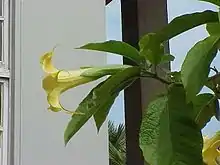Brugmansia aurea
Brugmansia aurea, the golden angel's trumpet, is a species of plant in the family Solanaceae. It is endemic to Ecuador. Since March 2014, it has been listed as Extinct in the Wild by the IUCN but before that, it was listed as Vulnerable.[1]
| Golden angel's trumpet | |
|---|---|
 | |
| Scientific classification | |
| Kingdom: | Plantae |
| Clade: | Tracheophytes |
| Clade: | Angiosperms |
| Clade: | Eudicots |
| Clade: | Asterids |
| Order: | Solanales |
| Family: | Solanaceae |
| Genus: | Brugmansia |
| Species: | B. aurea |
| Binomial name | |
| Brugmansia aurea Lagerh. | |
 | |
| Synonyms | |
|
Brugmansia pittieri | |
Despite being thought to be extinct in its native range, B. aurea is a popular ornamental and is widely cultivated, like the other members of its genus. It is sold and grown as a garden plant, described as a large subtropical shrub capable of growing to 20 feet in height. It has large yellow or white blooms with a pleasant fragrance which is at its strongest in the evening.[2]
Synonyms
- Brugmansia affinis
- Datura aurea
- Datura affinis
Toxicity
All parts of the plant are poisonous.[3]
Uses
Almost all tribes in the area of Ecuador used it as a poultice.
It is used as a deliriant. Its most potent cultivar is Culebra Borrachero, which has a high concentration of the psychoactive scopolamine. In Western medicine, scopolamine is used to prevent motion sickness.[4] It has also been used as a truth serum.[5] Borrachero loosely translates to "get-you-drunk", and scopolamine is also known as Devil's Breath[6] and burrundanga, among the world's "scariest drugs".[7]
References
- Hay, A. (2014). "Brugmansia aurea". IUCN Red List of Threatened Species. 2014: e.T38124A58906215. doi:10.2305/IUCN.UK.2014-1.RLTS.T38124A58906215.en. Retrieved 9 January 2018.
- "12 plants for evening scent". BBC Gardener's World Online. Retrieved 12 July 2019.
- "Angel's Trumpet," The Better Homes and Gardens Plant Encyclopedia.
- Pratt, Christina (2007). "Brugmansia Aurea". An Encyclopedia of Shamanism. Rosen Publishing. pp. 68–70. ISBN 978-1-4042-1040-0.
- House, Robert E. (1931). "The Use of Scopolamine in Criminology". The American Journal of Police Science. 2 (4): 328–336. doi:10.2307/1147361. ISSN 1547-6154. JSTOR 1147361.
- Draper, Lucy (September 3, 2015). "Does the 'Devil's Breath' Drug Really Exist?". Newsweek. Retrieved April 13, 2017.
- Cotroneo, Christian (September 3, 2013). "The World's Scariest Drug". The Huffington Post. Retrieved April 13, 2017.
| Wikimedia Commons has media related to Brugmansia aurea. |
